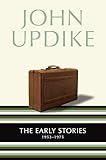When other writers at a 1986 PEN panel on “How the State Imagines” were lamenting Cold War militarism, John Updike offered a hymn of praise for the U.S. Postal Service: “I never see a blue mailbox without a spark of warmth and wonder and gratitude that this intricate and extensive service is maintained for my benefit.” His co-panelists were miffed, but there was no gainsaying him: Updike was a lucky man. Lucky in his chosen career; lucky with women (or at least, he wrote about “getting lucky” often enough); lucky in being an American at the peak of the American century.
Many remembrances of this literary polymath will focus on his native talent, and may be right to do so. Updike found his pellucid, synesthetic voice in his mid-twenties, and so seemed a kind of prodigy… even, at times, a prodigal. But at its best, what his voice expressed better than that of any other American novelist (with the possible exception of Saul Bellow) was gratitude for the superabundant gift – the sustained good luck – of everyday life.

 At the height of his powers… say, from 1959’s The Poorhouse Fair to 1996’s In the Beauty of the Lilies, Updike delineated a territory – American, lower- to upper-middle-class, uneasily suburban – that will ever after be associated with his name. In novel after novel, story after beautifully wrought story, he charted its tensions and ambiguities. That it is hard to remember that this territory was ever unfamiliar is a testament to the thoroughness of Updike’s cartography. Collectively, the novels of the ’60s and ’70s, the Rabbit Angstrom omnibus, and The Early Stories are a monumental achievement, one that will become clearer as the world they describe falls into the past.
At the height of his powers… say, from 1959’s The Poorhouse Fair to 1996’s In the Beauty of the Lilies, Updike delineated a territory – American, lower- to upper-middle-class, uneasily suburban – that will ever after be associated with his name. In novel after novel, story after beautifully wrought story, he charted its tensions and ambiguities. That it is hard to remember that this territory was ever unfamiliar is a testament to the thoroughness of Updike’s cartography. Collectively, the novels of the ’60s and ’70s, the Rabbit Angstrom omnibus, and The Early Stories are a monumental achievement, one that will become clearer as the world they describe falls into the past.
Somehow, Updike also managed to maintain a a sideline as a poet, as well as a prolific career as an essayist on literature and art. Though his opinions on each could be both narrow and strongly held, his Protestant circumspection always allowed room for doubt. His “rules for reviewing” remain a model of good faith and good sense.
As five books became ten, and ten became fifty, Updike’s “spark of warmth and wonder and gratitude,” which seemed to distill a generational trait, could at times flirt with self-satisfaction. We forgive a writer for everything but success, and in his later years, Updike’s critics would execute a kind of pincers movement. From one flank, he was attacked for rehashing old ground, for being (in books like Villages) too… Updikean. From the other flank, he was attacked for his attempts to move beyond first-hand experience (see: Seek My Face, Toward the End of Time, Terrorist). If each position had its merit – more than a decade has passed since Updike’s fiction felt urgent – both overlooked the fact that he had been experimenting with form and subject since the mid-70s. And well into his own eighth decade, his reviews and essays, which he produced with the dependability of a classic Buick sedan, bespoke a writer still alive to the surprise of the new.
In this, too, Updike was lucky: he outlived his aura of invincibility.
He will not, however, have outlived his reputation. Now that he is no longer among us, it will be easier not to begrudge him his good fortune, and to appraise his legacy. The career of Émile Zola, that other prodigy of the real, tells us that a few golden works will outweigh any amount of dross. Updike’s gold-to-dross ratio was, in retrospect, remarkable, and his good books many. They remind us of our own good fortune. We are lucky to have had him.









